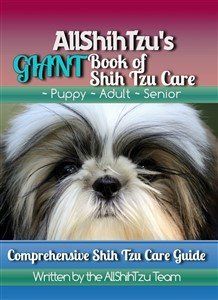Being Allergic to a Shih Tzu
Overview
Despite the Shih Tzu breed being often labeled as hypoallergenic, allergies to this breed are possible. It's even possible to have reactions to this breed while tolerating others well. In this article, we'll explore why allergies to a Shih Tzu can happen and provide strategies to minimize allergic reactions.
Please note: AllShihTzu is reader-supported, and some of the product suggestions on this page are affiliate links. As an Amazon Associate we earn from qualifying purchases. This is at no extra cost to you and helps keep this site running.
Why You Can Be Allergic to a Shih Tzu
Many people believe they won't be allergic to a Shih Tzu due to its coat of hair, which sheds less than fur. However, the common assumption that dog allergies are caused primarily by fur is incorrect. While fur can visibly accumulate on surfaces and clothing, causing allergic reactions, it's actually the allergens attached to the fur—like dander, saliva, and urine—that are the real culprits.
Additionally, breeds with thicker fur can trap more external allergens like dust and pollen, potentially exacerbating symptoms in sensitive individuals. Yet, dog allergies are highly individual. One might react differently to various breeds or even individual dogs within the same breed, unrelated to the type of coat.
The primary allergens from dogs include:
- Dander: The most common trigger, consisting of flakes of dead skin.
- Saliva Proteins: These can cause general allergies or direct contact reactions, like hives from a dog’s lick.
- Urine Proteins: Less common, but contact with urine traces on a dog's coat during grooming or petting can trigger reactions.
Therefore, the concept of a hypoallergenic dog breed is a bit misleading, and the Shih Tzu is no exception. Despite its hair coat, it produces dander and has saliva and urine, all potential allergy triggers.
Bella, photo courtesy of Melody A.
Signs of Being Allergic to a Dog
- Itchy eyes
- Runny nose
- Nasal congestion
- Sneezing
- Itchy skin
- Hives
- Coughing
- Wheezing
Testing to See if You Are Allergic to a Shih Tzu Before Getting a New Puppy
Before bringing a Shih Tzu puppy home, especially if you've had allergic reactions before, it's smart to test your sensitivity to the breed. Since dander and saliva protein levels vary between dogs, spending a full day with a Shih Tzu, if possible, is ideal for assessing your reaction. If not feasible, even a few hours can be indicative.
Possible Testing Methods:
- Dog-sit a Shih Tzu: Offer to dog-sit for someone you know who owns a Shih Tzu. This hands-on experience can help gauge your reaction.
- Visit a Shelter: Spend time with a Shih Tzu at a local shelter. Ideally, interact with a freshly bathed dog that's been isolated from others to minimize exposure to additional allergens.
- Multiple Visits with a Puppy: Rather than making a quick decision based on the puppy's appearance, arrange several visits of 20-30 minutes each to check for allergic reactions. Keep in mind, a puppy's allergen production may increase as it matures.
- Contact with a Puppy's Belongings: Request a blanket from the breeder that the puppy has been using. For highly sensitive individuals, this can trigger allergies quickly, providing insight into your potential reaction to the puppy.
These methods can provide a clearer understanding of how you may react to a Shih Tzu, aiding in a more informed decision about bringing one into your home.
Allergy Testing for a Specifically for the Shih Tzu Breed
11 Things to Do if You Are Allergic to Your Shih Tzu

Rocky at 1 year old, photo courtesy of Don V.
#4 Daily wiping. Wiping down a Shih Tzu with grooming wipes is an effective, yet often underrated method for maintaining cleanliness, reducing odor, and minimizing allergens like dander, urine, and saliva.
#7 Create an area for your Shih Tzu. Set up a comfortable yet not isolated area where your Shih Tzu can go if you need some distance. It should contain all the essential supplies like a bed, blanket, food and water, toys, and pee pads. If you're allergic, avoid placing this area in a room with carpeting, as it can trap dander and aggravate allergies. Use a dog bed with a washable cover, laundering it weekly.
Zeus, at 1 year and 4 months, photo courtesy of Alex and Troy

Lilo, photo courtesy of Lynn & Pat B.
Treatment for Dog Allergies
If you've simultaneously tried all the above measures and still suffer from allergies to your Shih Tzu, consult a doctor or allergist. Over-the-counter medications may help, but prescription nasal sprays, eye drops, or oral antihistamines can be more effective. Another option is immunotherapy (allergy shots), which gradually builds tolerance by injecting increasing allergen doses. While not guaranteed, it's effective for many and typically shows results within 12 months, with maintenance suggested for 3-5 years. Costs for immunotherapy can be around $1000 per year, often covered partially or fully by health insurance. This treatment is generally not recommended for children under 5 years old.
If You are Still Allergic to Your Shih Tzu After Trying All Methods and Treatments
Addressing allergies to a Shih Tzu requires commitment, and immunotherapy may not be feasible for everyone, especially if not covered by insurance. If home remedies fail and allergist help isn't an option, the difficult decision of whether to keep the dog may arise.
Remember, acquiring a dog is ideally a lifelong commitment, so finding alternatives to shelters is crucial if rehoming becomes necessary. Contact the breeder if the Shih Tzu is a puppy, as they might take it back to avoid shelter placement, though a refund is unlikely. Explore rehoming options with family, friends, or neighbors, and as a last resort, reach out to a local Shih Tzu rescue group.
More Articles:
How to Keep a Shih Tzu Clean - Shih Tzus have a knack for getting messy—whether it’s food on their face or dirt on their paws. Here’s how to keep your little guy or gal fresh and tidy between baths, with simple tips that actually work.
The Healthiest Fish-Based Treats for Shih Tzus – If your Shih Tzu could write their own menu, fish would definitely be in the rotation. Whether you're working around allergies or just looking for a lean, protein-rich option, check out these top treats packed with omega-3.
Shih Tzu Puppy Teething - What to expect during the teething phase, how to react to gnawing on non-toy objects and a list of helpful teething toys for pups with strong chewing urges.
Shih Tzu Feeding Guidelines - Details of all food-related topics. Schedules, wet vs dry, grain vs grain-free, homemade foods, top recommendations and more.
Shih Tzu Dental Care - Oral health is at the top of concern for the Shih Tzu breed and all pet parents should be actively cleaning their Shih Tzu's teeth. See our top tips to keep your little guy or gal's teeth clean, to prevent infections and future tooth loss.





